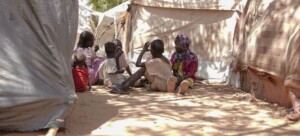Cholera Sudan: Push for environmental sanitation campaign
A campaign for environmental sanitation in all states of Sudan would help combating the outbreak of the cholera epidemic in Sudan, which has claimed hundreds of lives in ten states in a month.
A campaign for environmental sanitation in all states of Sudan would help combating the outbreak of the cholera epidemic in Sudan, which has claimed hundreds of lives in ten states in a month.
National Epidemiological Corporation member Dr El Fateh Omar El Sayed called on all Sudanese citizens on Friday to contribute to the campaign “as the first line of defence in combating the cholera epidemic”.
He told Radio Dabanga that the corporation criticised the Sudanese government for neglecting environmental sanitation, citing the accumulation of waste and dirt in Khartoum and the states. “This as a major contributor to the outbreak of the cholera epidemic.”
The Sudanese Minister of Environment, Hassan Hilal, publicly held the Ministry of Health responsible for the outbreak of 'acute watery diarrhoea'. He stressed that most of the diseases suffered by the Sudanese are caused by a lack of sanitation.
The minister pointed out that waste in the open causes pollution of the environment which may pose dangers to human health.
Casualty numbers
On Thursday, the number of hospitalised cases in the isolation ward of Kosti Hospital in White Nile state rose to 29. Spreading to eastern Sudan, and later to the Northern State and central Sudan’s El Gezira, the disease reached White Nile state in April, where a rapid spread of cholera is reported. Hospitals in North Kordofan started to receive cholera patients too.
A medical source in Kosti said that the local water network is contaminated and expected more cases of kidney failure because of the non-control of chlorine in the water.
On Thursday in Khartoum, a new patient with cholera was recorded at El Banjadeed Hospital in El Haj Yousif in Khartoum North. The number of hospitalised cases in the isolation ward at Elbanjadeed Hospital stood at 27.
“The non-establishment of an isolation centre in El Ezba district would lead to the transmission of the disease from the infected people in the houses to others,” activists in Khartoum North warned residents.
The security apparatus had closed a temporary cholera isolation centre which was established by the National Epidemiological Corporation in El Ezba on Saturday. The Popular Congress Party (PCP), however, reopened it the next day for people who might be infected with cholera.
The medical isolation centre at El Farshaya area, north of Delling in South Kordofan, recorded three new cases of cholera on Wednesday night. 34 others have remained in the centre without recovering from the infection so far. A medical worker confirmed to this station that the number of cholera cases has decreased and no new cases were recorded on Thursday.
In the state of El Gezira, the number of cholera patients in the isolation ward at El Marabee rose to 32 cases. A medical worker told Radio Dabanga that the casualty number has amounted from four to 90 infected cases since the beginning of the epidemic.
“In addition, El Marabee has been suffering from a severe drinking water crisis for several days.”
In two days, thirty-nine new cases of cholera in Umgargoura refugee camp, El Gedaref
In Umgargoura refugee camp in El Gedaref's El Fashaga, 39 new cases of cholera were recorded on Wednesday and Thursday. Youth activists have launched a voluntary campaign for environmental sanitation and health education in the camp.
The spokesman for the National Epidemiological Corporation, Dr Ali Bashir, said that 10 people in camp Um Gargur succumbed to the infectious disease. He has called on the authorities to provide the necessary medical care in the camp.
A lawyer of El Shorouk Forum in El Gedaref reported that the local hospital receives approximately 40 cases every day, with the recording of a number of deaths. Lawyer Ramzi Yahya said that the forum in El Shorouk will launch workshops for youths in Deim El Nour and other districts, to raise awareness about the prevention of cholera.











 and then
and then